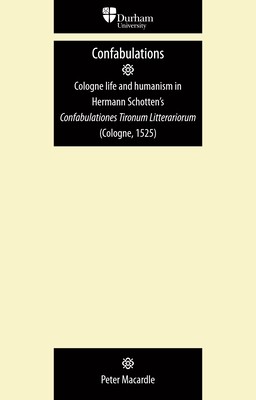
- We will send in 10–14 business days.
- Publisher: Manchester University Press
- ISBN-10: 0719081858
- ISBN-13: 9780719081859
- Format: 14 x 21.6 x 3.2 cm, softcover
- Language: English
- SAVE -10% with code: EXTRA
Confabulationes Tironum Litterariorum (Cologne, 1525) (e-book) (used book) | bookbook.eu
Reviews
Description
The humanist Hermann Schotten, or Hermannus Schottennius Hessus (c. 1503-1546), student, schoolmaster, and university lecturer in Cologne, was the author of a number of works on humanist pedagogy. His 'Confabulationes tironum litterariorum' of 1525, a collection of Latin dialogues designed to help schoolboys master Classical Latin conversation, was written in admiring imitation of the colloquies of Erasmus. But Schotten had his own distinctive style: a natural ear for dialogue, and a sympathetic understanding of the schoolboy world. As a result, he produced one of the liveliest pedagogical works of the century and a vivid and valuable cultural document of life in the early modern metropolis of Cologne. This critical edition of the 'Confabulationes', the first since the sixteenth century, makes this one-time best-seller available and comprehensible to modern readers. It presents the Latin text, a full English translation, and extensive notes on the language and on Schotten's many
literary and cultural allusions, accompanied by a detailed investigation of the early printing history of the collection.
EXTRA 10 % discount with code: EXTRA
The promotion ends in 14d.05:11:17
The discount code is valid when purchasing from 10 €. Discounts do not stack.
- Publisher: Manchester University Press
- ISBN-10: 0719081858
- ISBN-13: 9780719081859
- Format: 14 x 21.6 x 3.2 cm, softcover
- Language: English English
The humanist Hermann Schotten, or Hermannus Schottennius Hessus (c. 1503-1546), student, schoolmaster, and university lecturer in Cologne, was the author of a number of works on humanist pedagogy. His 'Confabulationes tironum litterariorum' of 1525, a collection of Latin dialogues designed to help schoolboys master Classical Latin conversation, was written in admiring imitation of the colloquies of Erasmus. But Schotten had his own distinctive style: a natural ear for dialogue, and a sympathetic understanding of the schoolboy world. As a result, he produced one of the liveliest pedagogical works of the century and a vivid and valuable cultural document of life in the early modern metropolis of Cologne. This critical edition of the 'Confabulationes', the first since the sixteenth century, makes this one-time best-seller available and comprehensible to modern readers. It presents the Latin text, a full English translation, and extensive notes on the language and on Schotten's many
literary and cultural allusions, accompanied by a detailed investigation of the early printing history of the collection.


Reviews